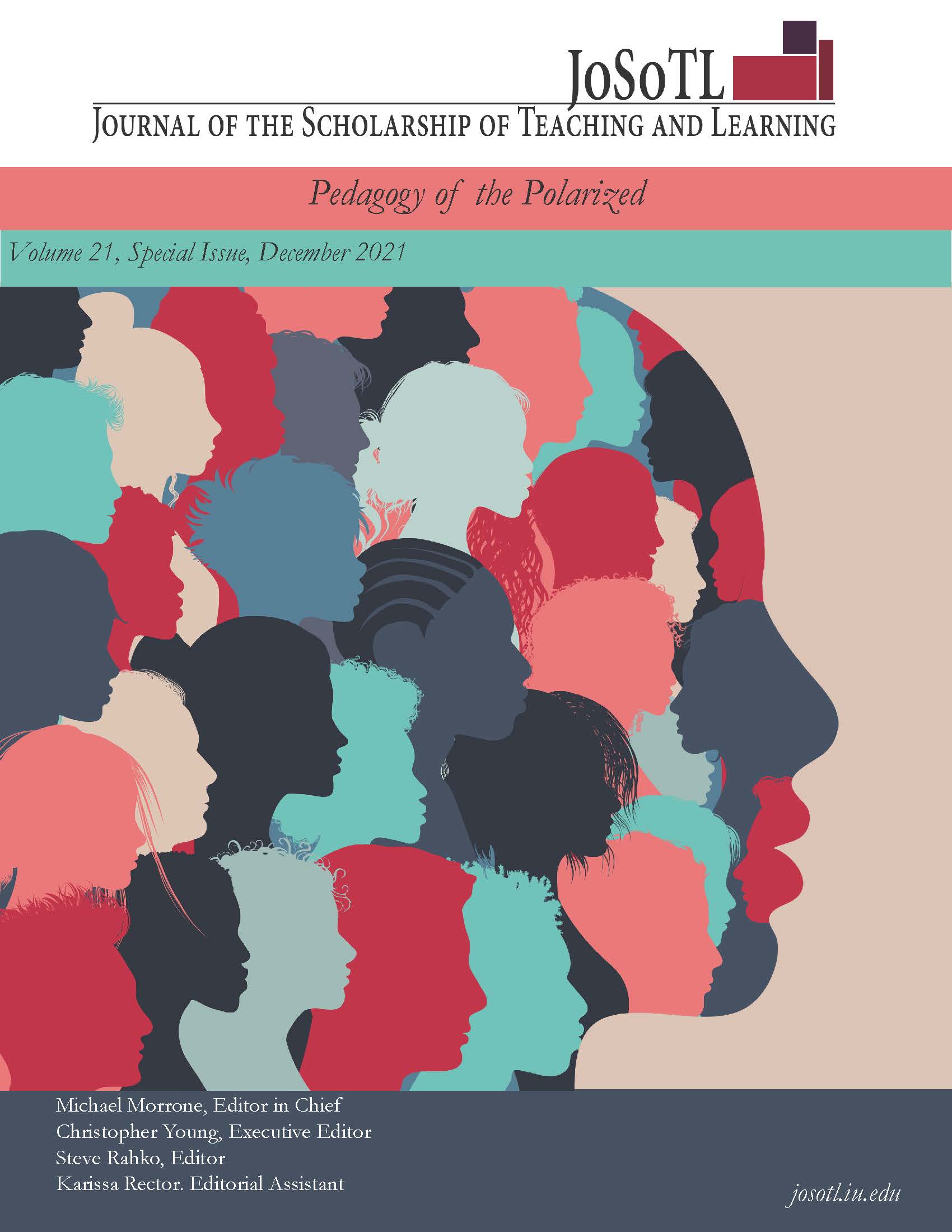Realms Without Totality Lyotard’s Post, Rancièresque, and the Strange Tools of Paralogy
Main Article Content
Abstract
This essay posits tensions in art, education, and politics by using philosophical discourse to suggest that the way to create transformative events for social change is to understand Lyotard's diagnosis of the current age and Rancière's call to critical art practice. By proposing new strategies and tactics such as 'post-art' and 'strange tools', the author tries to demonstrate in the text the indirect approaches advocated by Lyotard and Rancière in tackling the current post-political world.
Downloads
Article Details

This work is licensed under a Creative Commons Attribution 4.0 International License.
- Authors retain copyright and grant the Journal of the Scholarship of Teaching and Learning (JoSoTL) right of first publication with the work simultaneously licensed under a Creative Commons Attribution License, (CC-BY) 4.0 International, allowing others to share the work with proper acknowledgement and citation of the work's authorship and initial publication in the Journal of the Scholarship of Teaching and Learning.
- Authors are able to enter separate, additional contractual agreements for the non-exclusive distribution of the journal's published version of the work (e.g., post it to an institutional repository or publish it in a book), with an acknowledgement of its initial publication in the Journal of the Scholarship of Teaching and Learning.
- In pursuit of manuscripts of the highest quality, multiple opportunities for mentoring, and greater reach and citation of JoSoTL publications, JoSoTL encourages authors to share their drafts to seek feedback from relevant communities unless the manuscript is already under review or in the publication queue after being accepted. In other words, to be eligible for publication in JoSoTL, manuscripts should not be shared publicly (e.g., online), while under review (after being initially submitted, or after being revised and resubmitted for reconsideration), or upon notice of acceptance and before publication. Once published, authors are strongly encouraged to share the published version widely, with an acknowledgement of its initial publication in the Journal of the Scholarship of Teaching and Learning.
References
Baudrillard, J. (2008). Fatal Strategies, new edition (Semiotext(e) / Foreign Agents) (Reprint ed.). Semiotext(e).
Belting, H. (1994). Likeness and Presence: A History of the Image before the Era of Art. University of Chicago Press.
Danto, Arthur C. (2014). After the End of Art: Contemporary Art and the Pale of History. Princeton University Press.
Eagleman, D. (2020). Livewired: The Inside Story of the Ever-Changing Brain. Knopf Doubleday Publishing Group.
Foucault, M. (2012). Discipline and Punish: The Birth of the Prison. Knopf Doubleday Publishing Group.
Freire, P. (2014). Pedagogy of the Oppressed. Bloomsbury Publishing.
Freeland, C. (2001). But is it Art? An Introduction to Art Theory. Oxford University Press.
Groys, B. (2012). Introduction to Antiphilosophy. Verso Books.
Harman, G. (2019). Art and Objects. Wiley.
Heath & Potter. (2005). Nation of Rebels: Why Counterculture Became Consumer Culture. HarperCollins.
Hedges, C. (2009). Empire of Illusion: The End of Literacy and the Triumph of Spectacle. PublicAffairs.
Herman, E., & Chomsky, N., (2011). Manufacturing Consent: The Political Economy of the Mass Media. Knopf Doubleday Publishing Group.
Janicaud, D. (2005). On the Human Condition. Taylor & Francis
Joselit, D. (2013). After Art. Princeton University Press.
Kline, K. & Holland, K. (2020). Jean Baudrillard and Radical Education Theory: Turning Right to Go Left. Brill | Sense
Lyotard, Jean François. (1984). The Postmodern Condition: A Report on Knowledge. University of Minnesota Press.
Lyotard, Jean François. (1988). The Differend: Phrases in Dispute. University of Minnesota Press.
Lyotard, Jean François. (1992) "Answering the question: what is the postmodern?", in The Postmodern Explained to Children. Power Publications.
Moten, F. (2003). In the Break: The Aesthetics of the Black Radical Tradition. University of Minnesota Press.
Noë, A. (2015). Strange Tools: Art and Human Nature. Farrar, Straus and Giroux.
Plato. (2002). Plato: Five Dialogues: Euthyphro, Apology, Crito, Meno, Phaedo. Hackett Publishing Company, Incorporated.
Rancière, J. (1991). The Ignorant Schoolmaster: Five Lessons in Intellectual Emancipation. Stanford University Press.
Rancière, J. (2015). Dissensus: On Politics and Aesthetics. Bloomsbury Publishing.
Rolling, J. H. (2013). Arts-based Research Primer. Peter Lang Publishing.
Zabala, S. (2017). Why Only Art Can Save Us: Aesthetics and the Absence of Emergency. Columbia University Press.
Žižek, S. (2008) Violence. St Martins Press.
